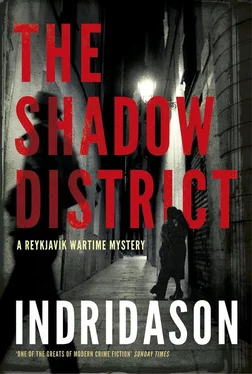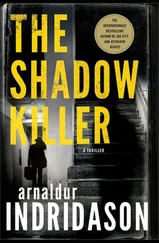‘No, that’s what he said. My son seemed to grow old before his time, and I blame it on that damned business.’
‘It was a difficult investigation.’
‘It hit him very hard. I don’t believe Flóvent was ever satisfied with the way the case was closed. In fact, I think he may have wanted to reopen it before he died. Of course, you never got his letter.’
‘His letter?’
‘He wrote to you but the letter was returned.’
‘Which letter?’
‘He didn’t know where to address it, so he tried sending it to your regiment but they sent it back. It should be around here somewhere. I found it among his papers after he died.’
The old man went into his bedroom and came out again with an envelope addressed to Thorson, which he handed over. Thorson opened it carefully and read the enclosed letter.
Reykjavík, 13 December 1947
My dear Thorson,
I hope this note will reach you. I don’t know if you made it through the war alive, but I wanted to try to find out.
Over the last couple of years I’ve often found myself thinking of you and our work together. I don’t know if I ever thanked you properly for all your assistance, cooperation and support, so I wanted to make amends for that now.
I can only begin to imagine the horrors you must have endured during the fighting. I’ve read a great deal about the Normandy landings and believe I have some idea, if only superficially, of the devastating bloodbath you must have witnessed first-hand.
Our final case is never far from my thoughts. I believe we came to the right conclusion, yet sometimes I feel a creeping suspicion that we could have done better. Pursued a different line of inquiry, perhaps. But this is probably only my uneasy conscience speaking, because of what happened to the boy. I have found it hard to come to terms with the way it ended. Naturally his family up north were shattered when they heard the news, but they didn’t blame us for what happened once they were apprised of all the facts.
Our principal witness and helper in all this was the MP’s son, Hólmbert. He confirmed all our suspicions about Jónatan, and this should have set my mind at rest, but for some reason the matter won’t give me any peace.
Well, my dear friend, I’d be grateful if you would send word, even if only a few short lines, to let me know how you are. I should be greatly reassured.
Yours, Flóvent
Thorson stood contemplating his old friend’s grave for a while, then made the sign of the cross and said a short prayer. Flóvent’s father was lying near at hand, and beyond his stone was one of the mass graves that had been dug at the height of the Spanish flu, where Flóvent’s mother and sister lay beneath the turf, side by side with other victims of the epidemic.
Rest in peace read the inscription on the headstone, and Thorson knew that if ever that prayer was appropriate for someone, it was for Flóvent.
With a little detective work, Thorson had discovered that Hólmbert was in a nursing home in Reykjavík, and it was there that he headed after his visit to the graveyard. He didn’t know the man from Adam, had never met him, though he had been a familiar face in the press over the course of his political career. His name had lingered in Thorson’s memory because Flóvent had made a point of noting how very helpful Hólmbert had been.
Thorson took the bus. Conveniently enough, it stopped close to the cemetery and its route also went right past the nursing home. He had given up driving. The fast-paced roads, the impatience of the other drivers, the heavy congestion these days: it had all become too much for him. Taking the bus was a far more pleasant way to travel, except in bad weather when it was easier to take a cab.
There were few other passengers to distract him, so he fell to thinking about his visit to the dressmaker’s daughter, Petra, and what she had told him about Rósamunda’s refusal to set foot in the MP’s house; about Hólmbert’s role in the whole affair, and his own recent telephone conversation with Magnús in Borgarnes, during which he had learnt for the first time about the presence of Magnús’s father and brother up north at the time of Hrund’s disappearance. Little by little the pieces of the puzzle were falling into place. Pieces he’d known nothing about until now. Pieces that had been deliberately withheld from him and Flóvent, because certain people had thought they were best swept under the carpet. The words of Flóvent’s letter were running through his mind as he walked in through the doors of the nursing home: for some reason the matter won’t give me any peace .
He asked for Hólmbert and was given his room number. He summoned the lift. Up to now he hadn’t discussed his enquiries and suspicions with Birgitta for fear of worrying her. Besides, he wanted to wait and see what came to light before he started spreading gossip that might not actually be true.
Having located the right room, Thorson saw a man of about his own age lying in bed, surrounded by photographs of loved ones, children’s drawings, and vases of flowers.
‘Hólmbert?’ Thorson said, inching his way into the room. ‘Is that you?’
The man didn’t answer, or react in any way. He was lying flat on his back and one would have thought he was asleep were it not for the fact that his eyes were open, staring up at the ceiling.
‘Excuse my barging in on you like this but—’
Thorson broke off when a nurse breezed in with a tray of medicines and a glass of water. Raising the patient up in bed, he helped him to swallow the pills.
‘Am I in the right room?’ asked Thorson. ‘This is Hólmbert, isn’t it?’
‘Yes,’ said the nurse. ‘You are...? Can I help you?’
‘I haven’t visited him before.’
‘Were you trying to talk to him? Hólmbert’s very far gone, I’m afraid. He’s got Alzheimer’s and hardly reacts at all to visitors.’
‘Oh, I had no idea. Alzheimer’s, you say?’
‘Are you a relative?’
‘An old acquaintance. I haven’t... we haven’t been in contact for many years. Does that mean there’s no point talking to him?’
‘You can talk all you like, but don’t expect any answers,’ the nurse said and continued on his rounds.
Thorson closed the door and sat down beside Hólmbert’s bed. He pitied the man his wretched fate, yet, however futile the gesture, he felt a compulsion to share with him the reason for his visit.
‘My name’s Thorson,’ he began. ‘One-time friend and colleague of a man called Flóvent. We conducted a murder investigation here in Reykjavík during the war. The victim’s name was Rósamunda and she worked for a dressmaker your family did business with. She used to take deliveries to your house until one day she flatly refused to go near the place again. Now it so happens that a few months before she died she was raped and her attacker told her to blame it on the huldufólk .’
Hólmbert lay motionless, staring at the ceiling with dull, colourless eyes.
‘Three years earlier a girl from Öxarfjördur, called Hrund, came out with the same story about being attacked by one of the huldufólk . She was so distraught after her ordeal that she vanished shortly afterwards. Took her own life perhaps. Or had an accident. At all events her body was never found. Then again, it’s possible that she was disposed of, and that the culprit was an important man from Reykjavík who just happened to be visiting the area at the time.’
Thorson shifted closer to Hólmbert.
‘Can you tell me anything about that?’
Hólmbert didn’t react.
‘Had you left the area or were you still in Öxarfjördur when she disappeared?’
Читать дальше












